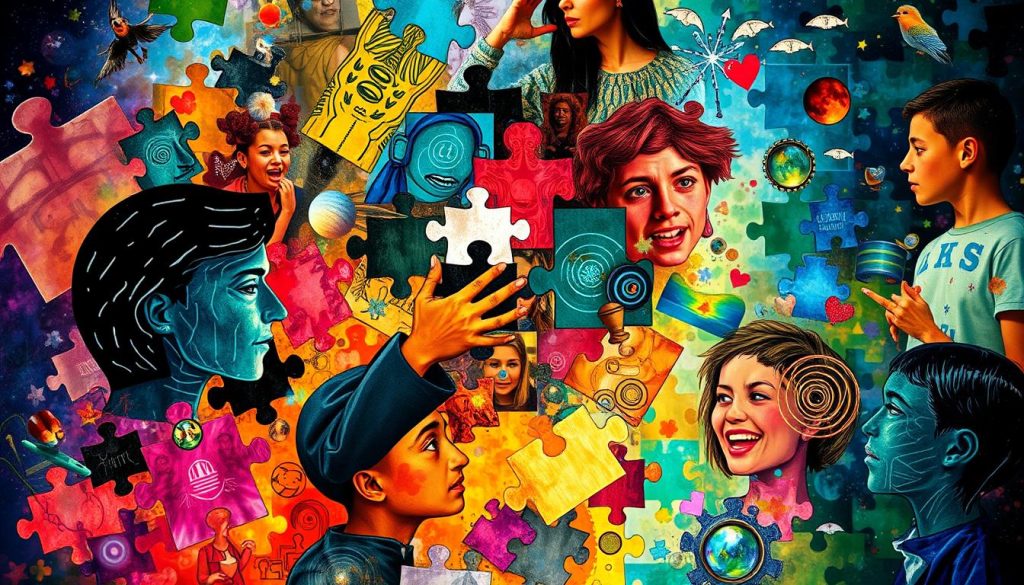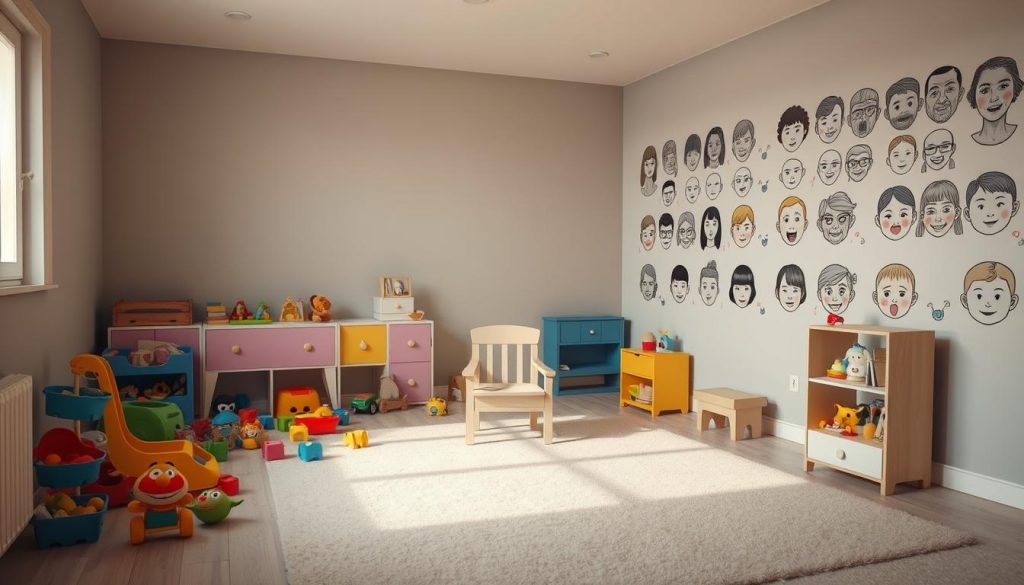Spotting the early signs of autism is key for early help. This guide looks at the main signs of autism spectrum disorder. It helps parents and caregivers see if their child might have autism. Knowing what are the symptoms of autism can lead to an early diagnosis and better care.
Autism spectrum disorder symptoms can vary a lot. They often include trouble with social interaction, communication, and repeating behaviors. By learning about these signs early, you can get your child the help they need sooner. Let’s explore the important details about autism spectrum disorder symptoms and how to spot them early.
Understanding Autism Spectrum Disorder: A Comprehensive Overview
Autism Spectrum Disorder (ASD) is a complex condition that affects people differently. It impacts social skills, communication, and behavior. This overview will cover the main features of ASD, its spectrum nature, and how common it is.
What Defines Autism Spectrum Disorder
Autism symptoms usually show up in early childhood and last a lifetime. Key signs include:
- Challenges in social communication and interaction
- Repetitive behaviors or restricted interests
- Sensory sensitivities
- Difficulty with changes in routine
The Spectrum Nature of Autism
The term “spectrum” means ASD symptoms and severity vary widely. Some people with ASD need a lot of support, while others can live on their own. This shows why each person needs a unique approach to help and support.
Current Statistics and Prevalence
Autism has become more common in recent years, thanks to better diagnosis and awareness. Here are some current numbers:
| Statistic | Value |
|---|---|
| Prevalence in the US | 1 in 36 children |
| Male to Female Ratio | 4:1 |
| Average Age of Diagnosis | 4 years old |
Knowing these facts helps us understand the size of the autism issue. It’s important to spot autism symptoms early for better support and outcomes.
What Are the Symptoms of Autism
Autism behaviors show up in many ways, making it important to spot them early. Knowing the signs of autism helps parents and caregivers see the red flags. Let’s look at common signs in different areas of development.

Children with autism often struggle with social interactions. They might not make eye contact, not respond to their name, or not want to play with others. They can also find it hard to understand social clues or share feelings.
Communication issues are another big sign. Some kids with autism talk late or don’t talk at all. Others might repeat words or find it hard to have back-and-forth talks.
- Repetitive behaviors or restricted interests
- Sensory sensitivities (over or under-responsive)
- Difficulty with changes in routine
- Unusual body movements (hand flapping, rocking)
Other signs include intense focus on certain topics or objects. Kids with autism might also not like changes in their daily routines. They could react strongly to certain sounds or textures.
It’s important to remember that autism symptoms vary a lot. If you see several of these signs often, get a professional to check. Early help can really improve a child’s life and growth.
Recognizing Early Signs of Autism in Infants
Spotting early signs of autism in babies is key for early help. Parents and caregivers should watch for certain behaviors that might show autism developmental delays.
Social Interaction Patterns in Babies
Infants with autism may act differently in social situations. They might not make eye contact, ignore their name, or not play peek-a-boo. These signs can start as early as 6 to 12 months.
Response to Sensory Stimuli
Some babies react strangely to sounds or touch. They might get too upset by loud noises or certain textures. Others might not notice sounds at all. Look for extreme reactions to what’s around them.
Early Movement and Behavioral Patterns
Some babies move in ways that might signal autism. Watch for things like hand-flapping or rocking. They might not reach for things or show delays in moving. These could be signs that need a doctor’s check.
- Limited babbling or cooing by 12 months
- No gestures like pointing or waving by 12 months
- No single words by 16 months
- No two-word phrases by 24 months
Every child grows at their own pace. If you see these signs, talk to a pediatrician. They can check if there’s a chance of autism developmental delays.
Social Communication Challenges in Autism

Autism spectrum disorder often brings unique social communication challenges. People with autism may struggle to interpret facial expressions, body language, and tone of voice. These difficulties can make it hard to form friendships and navigate social situations.
Communication difficulties in autism manifest in various ways. Some individuals might avoid eye contact or have trouble starting conversations. Others may speak in a monotone voice or repeat phrases they’ve heard before. These autism behaviors can sometimes lead to misunderstandings in social interactions.
Many autistic people find it challenging to understand sarcasm, jokes, or abstract language. They might take things literally, missing subtle social cues that neurotypical individuals pick up on easily. This can result in awkward social exchanges or feelings of isolation.
- Difficulty reading non-verbal cues
- Trouble maintaining back-and-forth conversations
- Challenges in sharing interests or emotions with others
- Tendency to focus on specific topics intensely
Despite these challenges, many individuals with autism develop strategies to improve their social communication skills. With support and practice, they can learn to navigate social situations more comfortably and build meaningful relationships.
Behavioral Patterns and Restricted Interests
Autism behaviors show unique patterns and focused interests. These traits shape how people interact with their world and others. It’s important to understand these to support those on the spectrum.
Repetitive Behaviors and Routines
People with autism may do repetitive actions. This can include hand-flapping, rocking, or repeating words. These actions often bring comfort and stability.
For some, sticking to strict routines is vital. Any change can upset them.
Specific Interest Fixations
Restricted interests in autism are common. A person might deeply focus on a specific topic. This could be anything from trains to astronomy.
Their knowledge in these areas is often very detailed. While these interests can be a strength, they may limit social interactions.
Resistance to Change
Many with autism find it hard to adapt to changes. Even small changes in daily life can cause anxiety. Supporting individuals through changes is key for their well-being.
Understanding these autism behaviors helps create supportive environments. It allows for better communication and respect for the unique ways individuals with autism experience the world. By recognizing these traits, we can foster more inclusive communities.
Language Development and Communication Red Flags
Language development is key in spotting autism red flags. Kids with autism often have unique ways of talking and interacting. These signs can help parents and caregivers know when to get a professional check-up.

Children with autism face big communication challenges. They might find it hard to talk or use body language. Some signs include:
- Delayed speech or no speech at all
- Difficulty understanding or using gestures
- Lack of eye contact during conversations
- Repeating words or phrases without context (echolalia)
- Trouble maintaining a back-and-forth conversation
Spotting these signs early can help with early help. Remember, every child grows at their own pace. But if they keep having trouble talking, it’s time to look into it more.
| Age | Typical Development | Potential Autism Red Flags |
|---|---|---|
| 12 months | Responds to name, uses simple gestures | No response to name, limited gestures |
| 18 months | Uses several words, points to show interest | Few or no words, doesn’t point to objects |
| 24 months | Uses 2-word phrases, follows simple instructions | No 2-word phrases, doesn’t follow instructions |
If you see these talking troubles lasting, talk to a doctor or speech therapist. Early help can make a big difference for kids with autism.
Sensory Processing Differences in Autism
Sensory processing differences are key characteristics of autism. People with autism often see the world differently. This is because of unique sensory perceptions. These differences can greatly impact their daily lives and behaviors.
Hypersensitivity to Stimuli
Many individuals with autism are hypersensitive to certain stimuli. This means they may find everyday sounds, lights, or textures overwhelming. For example, a buzzing fluorescent light might be unbearable, or the texture of certain fabrics could cause discomfort.
Hyposensitivity Patterns
On the flip side, some people with autism may be undersensitive to stimuli. They might not respond to pain or extreme temperatures as expected. This hyposensitivity can sometimes lead to unintentional self-harm or risk-taking behaviors.
Sensory Seeking Behaviors
Sensory seeking is another common autism behavior. Some individuals may crave intense sensory experiences. They might spin, rock, or seek deep pressure to fulfill their sensory needs.
| Sensory Difference | Example | Potential Impact |
|---|---|---|
| Hypersensitivity | Covering ears in noisy environments | Difficulty in social settings |
| Hyposensitivity | Not noticing extreme temperatures | Potential safety risks |
| Sensory Seeking | Constant rocking or spinning | May be misinterpreted as disruptive behavior |
Understanding these sensory differences is key for supporting individuals with autism. It helps explain many autism behaviors. This allows for better accommodation in various environments.
Motor Skills Development and Coordination
Motor skills development is vital for kids, but it can be tough for those with autism. Children with autism often face delays in both fine and gross motor skills. This affects their daily life and overall growth.

Fine motor skills are about small muscle movements, like holding a pencil or buttoning a shirt. Many kids with autism struggle with these tasks, showing signs of developmental delays. Occupational therapy can help improve these skills through specific exercises and activities.
Gross motor skills involve bigger muscle groups and whole-body movements. Kids with autism often have trouble with coordination, balance, and spatial awareness. This can make it hard to run, jump, or catch a ball.
| Motor Skill | Typical Development | Autism-Related Challenges |
|---|---|---|
| Walking | 12-18 months | May be delayed or have unusual gait |
| Grasping objects | 3-4 months | Difficulty with precision grip |
| Riding a bike | 5-7 years | May require additional support and time |
Early intervention is key in addressing motor skill challenges. Physical therapy, adaptive physical education, and specialized equipment can help kids with autism. They can improve their motor skills and feel more confident in their abilities.
Emotional Expression and Recognition
For people with autism, showing and understanding emotions is tough. They find it hard to read faces, manage feelings, and connect with others. These are big parts of autism behaviors.
Understanding Facial Expressions
Many with autism have trouble reading faces. They might not catch small changes in expressions or get emotions wrong. This can cause social problems and make talking hard.
Managing Emotional Responses
Handling emotions is a big challenge for those with autism. They can react strongly to things or have trouble showing feelings. This is a key part of autism that affects everyday life.
Building Emotional Connections
Creating strong emotional ties is hard for people with autism. They might struggle to understand or share feelings. This can hurt their relationships with family, friends, and classmates.
| Emotional Aspect | Common Challenges | Potential Strategies |
|---|---|---|
| Facial Expressions | Difficulty interpreting subtle cues | Social skills training, visual aids |
| Emotional Responses | Intense reactions, trouble regulating | Emotional regulation techniques, therapy |
| Emotional Connections | Challenges with empathy and bonding | Practice active listening, social stories |
Play Patterns and Social Interaction
Play patterns and social interactions can show early signs of autism in kids. Children with autism often have unique behaviors during play. This makes them stand out from their friends.

Children on the autism spectrum might play alongside others but not with them. This is a sign of social challenges. They might also prefer repetitive actions or lining up toys instead of playing make-believe.
Social interactions can be tough for kids with autism. They might find it hard to join in group activities or accept play invitations. They might not make much eye contact or share toys easily.
| Typical Play | Autism-Related Play |
|---|---|
| Engaging in pretend play | Repetitive actions with toys |
| Joining group activities | Preferring solitary play |
| Sharing toys easily | Difficulty sharing or turn-taking |
| Varied interests in toys | Fixation on specific objects |
Spotting these early signs of autism in play can help parents get early help. If you see unusual play patterns or social issues, talk to a healthcare professional. They can offer guidance and support.
Common Developmental Milestones and Delays
Knowing about developmental milestones is key to spotting autism early. Parents and caregivers need to watch for progress in speech, social skills, and physical growth.
Speech and Language Milestones
Children reach speech milestones at set ages. By 12 months, they say their first words. By 24 months, they use two-word phrases. If they’re slow in these areas, it could be a sign of autism.
Social Skills Development
Social skills grow as kids get older. Babies smile at faces by 2 months and play peek-a-boo by 9 months. Toddlers start showing interest in other kids by age 2. Signs of autism might include not making eye contact or not wanting to play with others.
Physical Development Markers
Physical milestones include rolling over, sitting up, and walking. Babies roll over by 4 months, sit without help by 6 months, and start walking by 12 months. While not always a sign of autism, delays in these skills can sometimes mean other autism symptoms are present.
| Age | Speech | Social | Physical |
|---|---|---|---|
| 6 months | Babbles | Responds to sounds | Sits with support |
| 12 months | First words | Plays peek-a-boo | Takes first steps |
| 24 months | Two-word phrases | Plays alongside others | Runs and climbs |
Every child grows at their own speed. If you see big delays or signs of autism, talk to a doctor right away.
When to Seek Professional Evaluation
Spotting autism red flags early is key. If your child has trouble with social skills or communication, or shows odd behaviors, see a doctor. These signs can appear before they’re three years old.
Listen to your instincts. Parents often notice something’s off before others do. If you’re concerned, don’t hesitate. Early intervention can greatly help your child’s development. Doctors use special tests and observe your child’s behavior and speech.
Every child grows differently. But if your child misses important milestones or acts very differently, it’s time to get checked. Early help is essential for your child’s success.
Many places offer autism screenings. Your family doctor, pediatrician, or local child development center can help. They’ll guide you on what to do next and find support for your family.
FAQ
Q: What are the main symptoms of autism?
A: Autism symptoms include trouble with social communication and interaction. People with autism might have a hard time making eye contact or understanding social cues. They may also have intense interests and strict routines.
They might focus too much on certain topics. This can make it hard to have conversations or follow social rules.
Q: At what age can autism be diagnosed?
A: Autism can be diagnosed as early as 18 months to 2 years old. But, some signs might show up even earlier. It’s important to get early screenings for the best support.
Q: What are some early signs of autism in babies?
A: Early signs in babies include not making eye contact or not responding to their name. They might not babble or speak on time. They might not play interactive games or want to be picked up.
Remember, these signs don’t mean every baby with these traits has autism.
Q: How does autism affect communication?
A: Autism can make talking hard. People might speak late, have trouble keeping conversations going, or interpret words too literally. They might repeat words or have trouble with non-verbal cues like gestures.
Q: What are some common restricted interests in autism?
A: People with autism often have strong interests in specific topics. They might focus a lot on things like trains or dinosaurs. They might also have a strong attachment to certain objects or play patterns.
They might know a lot about their favorite topics.
Q: How does autism impact sensory processing?
A: Autism can affect how people feel and react to different senses. Some might be too sensitive to sounds or lights. Others might seek out intense sensory experiences.
This can really impact their daily life and behavior.
Q: Are there any physical signs of autism?
A: Autism is mostly about behavior and development, not physical signs. Some people might have motor delays or unusual ways of moving. But, these signs are not the same for everyone.
Autism can’t be diagnosed just by looking at someone’s body.
Q: How does autism affect social skills development?
A: Autism can make social skills hard to develop. People might struggle to understand social rules or make friends. They might have trouble with play or understanding others’ feelings.
Q: What are some common autism behaviors?
A: Common behaviors include repetitive movements and strict routines. People might focus too much on certain interests. They might have trouble with changes or understanding language in a literal way.
They might also find social interactions and communication challenging.
Q: How can parents recognize autism red flags in their child?
A: Parents should watch for signs like not making eye contact or not responding to their name. Look for delays in speech or unusual reactions to sounds or lights. Also, notice if their child has repetitive behaviors or doesn’t play like others.


















